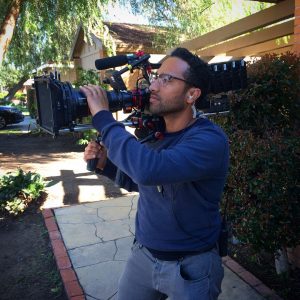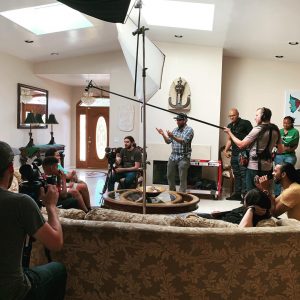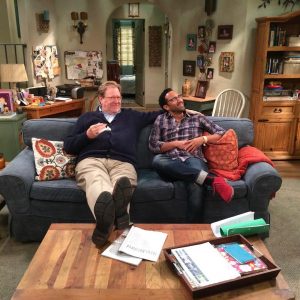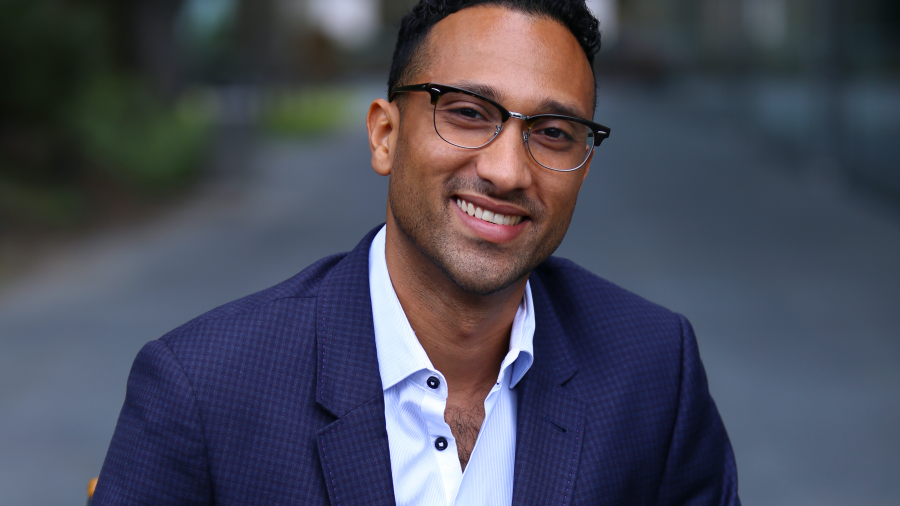By Cori Dioquino
Film Fest Magazine sits down with filmmaker and screenwriter Nate Cheney to talk about being Mixed Up, writing your own story and finding the positive in any situation.
What sparked your love for filmmaking?
My mom told me about Gordon Parks, a filmmaker who grew up in Fort Scott, a few miles from where I grew up in Southeast Kansas. I couldn’t believe that there was a Black person that made movies, honestly. I grew up in a really small, White community. My mom is White and my dad is Black and Native American. Seeing anyone of any color other than White was pretty rare. And everyone that I did see that was of color was my family. So I started reading about Gordon Parks.
My mom and my uncle knew I was passionate about filmmaking. I always talked about it, I was so enamored by the whole process. They chipped in together and bought me a High 8 video camera. And then, after that, the zone was poppin’! I shot my first short narrative when I was 13.
What was that about?
Oh, it was painful. I actually found it on a tape the other day and watched it. Everything that’s politically incorrect was definitely done there! We were supposed to write an essay in history class. Me and my buddy somehow convinced our teacher to let us shoot our essay into a narrative story.
It turned into this ridiculous video that I cut together old school with a razor blade, superglue and two VCRs. We showed it to the class and I guess it was so entertaining that word got around the school that we did this. We ended up getting every other class in the whole school to watch it.

Nate Cheney behind the scenes for a shoot.
How did you get into documentary filmmaking?
I did documentaries mostly because of my financial restraints and lack of access to a lot of equipment. As I started to build that network and go further, I realized how much of an asset it is to have that background as a storyteller.
I graduated from high school and I wanted to go to film school. But it didn’t happen in a straight, clear path. I ran into this old high school friend and we wanted to shoot a documentary. We didn’t know what we wanted to talk about, but we hated our jobs. We ended up shooting this short documentary called “Punch Clock”.
The documentary focused on how dreams change. We focused on local people in and around our small town. It was really insightful. We started to learn about people. It opened our eyes to realize that things in life aren’t so black and white.
As someone who’s mixed race, how has filmmaking empowered you?
I grew up in a really conservative community and it was really hard for me to see art outside of a Norman Rockwell setting because that’s what my little bubble was telling me art was. I learned that you have to start creating your own platforms. You can’t always wait for someone else to just give you the stamp of approval. It doesn’t mean that you’re not good enough and it doesn’t mean that you’re not qualified. It just means that as a filmmaker, as a person of color, you may not have access to that stuff, but you’re going to have to do it anyways.

Behind the scenes for Bakers Boys.
What do you focus on when you tell a story?
I feel like the human experience can be painful, but looking at it in a positive light is what I hope to do. In comedy there’s pain. Whether it’s physical, or any other type of comedy, the funniest moments are when people are uncomfortable or even hurting.
My hope and my goal as a storyteller, director, producer, writer is to address the real issues in society that are going on but also give people a ray of hope. And I feel that’s what people want when they go to the movies.
Do you have any projects coming up that are less documentary and more narrative?
I just finished writing a feature called Mixed Up. It’s a loose autobiography about my life growing up in 1994 Southeast Kansas and the troubles of being a mixed race person.
It’s honest and also funny. It’s something that I want to explore. There are a lot of Black stories out there, but for me being mixed up, I never really felt Black enough and I was never White enough. It’s this story where you’re in the middle. What do you do when you’re in the middle? People talk about code switching and different things that people do, and this makes you look at it from a different perspective.
I think if people are honest with themselves, that is something that they at some point in their life have experienced – not being enough of something.
It’s systemic. I think that’s what systemic racism is all about – creating a system where everyone is centered around White existence and you’re always measuring yourself to a White person and if you’re not that on any level then you’re questioned.
The counter of that is, “Okay, well we’re not going to do that. We’re going to measure ourselves as all Black.” And we go full extreme to the opposite. At the end of the day, we’re still basing ourselves on the institutionalized idea that people aren’t good enough because of the complexion of their skin. I don’t think the majority is on either extreme. I think most people are in the middle and kind of confused. But those aren’t the things that are getting the headlines.
Where are you in the production or pre-production process for Mixed Up?
I just found out that I made it to the second round of the Sundance Writing Lab and the second round of Austin Film Festival Screenplay competition. So we’ll see what happens with that.
Mixed Up also made it to Diverse Voices. I was a finalist. It’s a Coverfly writing competition. Even though I didn’t win, one of the people who hosts the program called me and told me, “I read your script, it’s so awesome. Let’s work on trying to get you representation.”
As an indie filmmaker, what are some of your thoughts or concerns about how the pandemic will affect the indie film industry?
The indie industry has always been struggling. I think that’s the pride and the joy of being an independent filmmaker, is to say, “We’re going to do the impossible! We have a dollar in our pocket and we’re going to make a feature film!” There is something exciting about that.
It’s all about perspective. Whether you have a $10 million budget or a $500 budget, you’re always going to be worried about money and not having enough. I think that’s the smaller issue. The bigger issue is really knowing your story and believing in it. Life is going to happen and situations are going to happen. It’s about being a good steward over what you have. I think that’s what it comes down to.

On set for the film Mom.
Do you think you’ve had an opportunity amidst the shut downs to focus on things you weren’t able to focus on before, like writing Mixed Up?
Absolutely. Writing this script was definitely a priority. It was something that had been on my mind for 2-3 years. I kept trying to find the time… and then I finally had the time. I had to hold myself accountable and sit down and try to write at least five pages a day. And some days were complete failures. Other days I was writing seven or eight pages. I think that’s the reality of life. It’s about that balance. Learning to forgive yourself and keep doing it anyways.
Any other new projects we should look out for?
I’m a producer for a new TV show for People Magazine. It airs on select stations around the U.S. and starts streaming on September 14.
If you were to give a young filmmaker advice, perhaps someone with a similar background as you, what would you say?
Be patient with yourself and realize that it’s just not gonna happen overnight. It’s the daily things. My mom always tells me “destiny is daily”. It’s something as simple as writing a paragraph, or doing research, editing that one video or just shooting the idea that you think is stupid. It may not be stupid.
I was definitely my own worst enemy. My perfectionism definitely killed my creativity and my progress. It took a lot for me to realize that not everything I shoot is going to make me an Oscar winner. But I can work up to that. I’ve learned the most from the worst sets and the worst scripts. I’ve learned the most from horrible experiences.
My other advice is stop complaining. Things are never going to go as planned. But when you can understand that that’s the beast you’re trying to tame, you realize that’s part of the excitement of it; being able to go with the flow. And if you don’t like that kind excitement, then you’re in the wrong industry.

